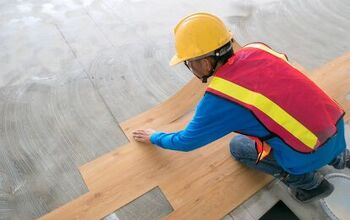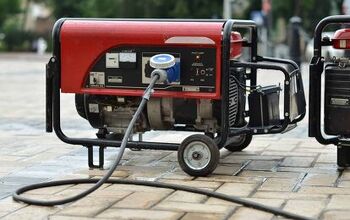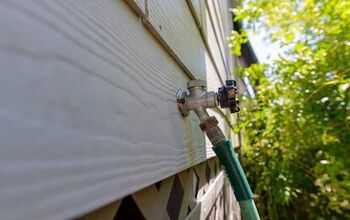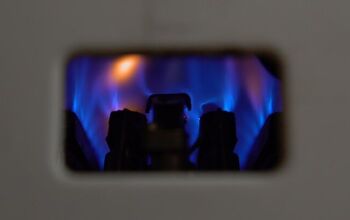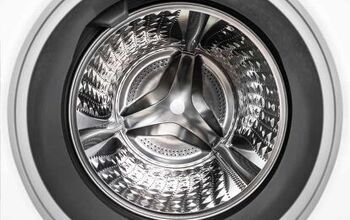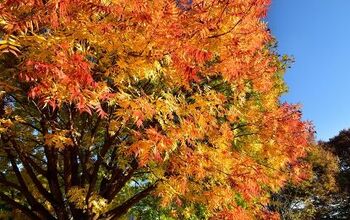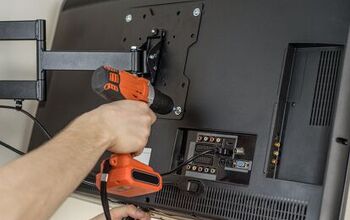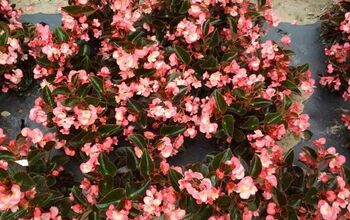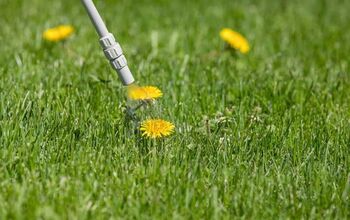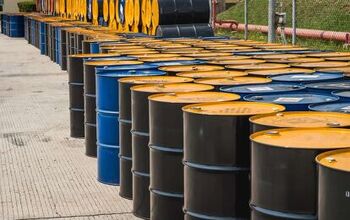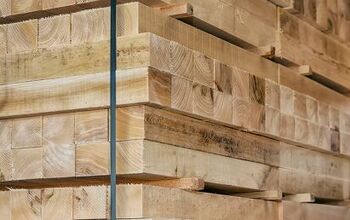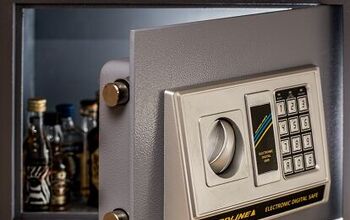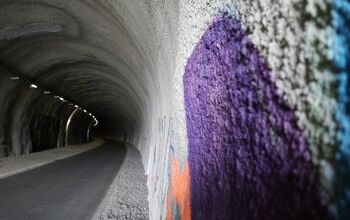When Should You Winterize Your Sprinkler System? (Find Out Now!)

Winterizing your lawncare equipment seems like a fool’s errand at times, but believe me, it’s something you should do. It’s what makes sure that you will be able to use your sprinklers once summer comes around. Like with all chores, there’s a right time and a wrong time to start winterizing your system. But, when’s ideal?
Depending on where you live, the best time to winterize your sprinkler system could be early to late fall. If you’re not sure when is a good time to do it, try to work your winterization plans so that your time spent will be around the first week prior to your first winter freeze.
If you want to keep your lawn healthy, winterizing everything is a smart move. You just need to know how to make the most of your winterization time.
Do You Need to Hire a Sprinkler System Contractor?
Get free, zero-commitment quotes from pro contractors near you.

Why Do You Need To Winterize Your Sprinkler Systems?
Winter is brutal in many parts of the country. Your sprinkler system will have water that stays in the tubing, especially when you have an underground system. During the winter, that water can expand and potentially break your sprinkler tubing. Winterizing them prevents water from freezing in your system, which in turn, means good things for your system and its lifespan.
Are There Any Alternatives To Winterizing Sprinklers?
Not really. Unless you want to remove the entire system and replace it in the spring, you’re out of luck as far as alternatives go. Winterizing is the only way that you can really prevent it from harming your sprinklers and your lawns. Ergo, it’s a must-have if you want to make sure that you get the most out of your sprinkler system.
How Do You Winterize Your Sprinkler System?
Honestly, that’s a whole ‘nother article. If you need to learn how, check out our article on how to winterize your sprinkler system here. Don’t have a backflow preventer? It might be better to check out a model-specific tutorial, then. It’s a process that can change depending on the number of sprinkler heads and how complex your system is.
The basic gist of winterizing a sprinkler system is that you have to tilt the sprinkler heads a certain direction and blow out any extra water that could be pooling inside the system. Most people will use pressurized air. From there, the sprinklers are left tilted and open so that they can stay dry through the winter.
Does Everyone Have To Winterize Their Sprinkler Systems?
One of the most amazing things about living in America is the sheer difference in climates that you can experience just by moving across the country. If you live in an area that gets snow every year, then winterizing your sprinkler systems is a major must. Otherwise, you may end up replacing your sprinklers annually instead.
However, that doesn’t mean that every part of the country requires winterization. If you live in a part of the country where winter is not cold, then you might be able to skip winterization. This would include areas like the Florida Keys, El Paso, Sedona, and Death Valley.
How Can You Tell If You Live In An Area Where Winterization Is A Smart Idea?
If you are not sure whether your sprinklers are at risk of freezing, the best thing you can do is shut down your sprinklers and winterize them anyway. It’s better to be safe than sorry. This way, you won’t have to try to scramble for a lawncare company to help you before that first major storm of the season.
If you aren’t sure whether you should spend that money, then you might want to check with lawncare companies near you. Most won’t offer winterization if it’s not needed in your region, or at the very least, won’t press you to buy their services. They don’t want to have to do work that doesn’t benefit you.
How Much Does It Cost To Winterize Your Sprinkler System?
Like with most other home improvement projects or maintenance projects, it depends on the system you have as well as the area where you live. Most people will pay between $83 to $110 for a winterization service for their irrigation systems. But there are other factors to consider. We suggest reading up our price guide too.
How Long Does Irrigation System Winterizing Take?
Though it depends from system to system, most people would agree this is a fairly quick process. It shouldn’t take more than a couple of hours for most larger homes. In some cases, it could actually take less than an hour to complete. Most DIYers will take a bit longer than that, though!
How Does Homeowner’s Insurance Cover Sprinkler Winterization?
If you have homeowner’s insurance, then it’s important to remember that you are going to be liable for the costs of maintaining your home. This includes maintaining your home’s irrigation system. So, don’t file a claim in hopes of getting money for winterization.
It’s important to note that your insurance company might also ask if you’ve winterized your sprinklers if you recently filed a claim for damage. People who skipped out on this during their last winter will find that their claim could be denied or reduced. After all, maintenance is a main cornerstone of decision making on a claim.
Should You Winterize Your Sprinklers If You Heard About An Upcoming Storm?
If you can’t tell from the rest of this article, the best advice we can give is that you should do this before any major winter weather occurs. That way, an upcoming storm won’t be a problem because you’ve already worked out the kinks and prepared yourself.
If you got lazy and decided to put it on the backburner, then yes, you should try to winterize your sprinklers before that storm hits. Otherwise, you’ll have to pay more to fix everything once the snow, sleet, and ice have subsided. (Note: Repairs after a major storm can cost as much as $250 or more, depending on the freeze.)
Do You Need to Hire a Sprinkler System Contractor?
Get free, zero-commitment quotes from pro contractors near you.

Related Questions
Can you just dry out the sprinklers and shut them off instead?
Technically, yes you can. As long as you make sure that your sprinkler system is dry and then shut off for the end of your watering season, you shouldn’t experience too much of a problem. With that said, this is technically a form of winterization. So, either way, it’s still a good way to ensure that you don’t deal with the fallout from frozen pipes.
How much air pressure do you need to “blow out” your sprinklers during winterization?
It doesn’t take too much to make your sprinkler system run clean, but too much air pressure can actually hurt more than it helps. To ensure that your sprinklers don’t end up burning out or bursting, keep the air pressure below 50 PSI at all times. Air volume is best high, but the pressure of your air compression machine should remain low.
What is considered to be a “hard freeze” in lawn care?
Hard freezes are the temperature at which your lawn will see serious damage and you run the risk of having your sprinkler system burst if it’s not treated with winterization. Most of the time, the definition of a hard freeze starts around 0 degrees Fahrenheit and below.

Ossiana Tepfenhart is an expert writer, focusing on interior design and general home tips. Writing is her life, and it's what she does best. Her interests include art and real estate investments.
More by Ossiana Tepfenhart



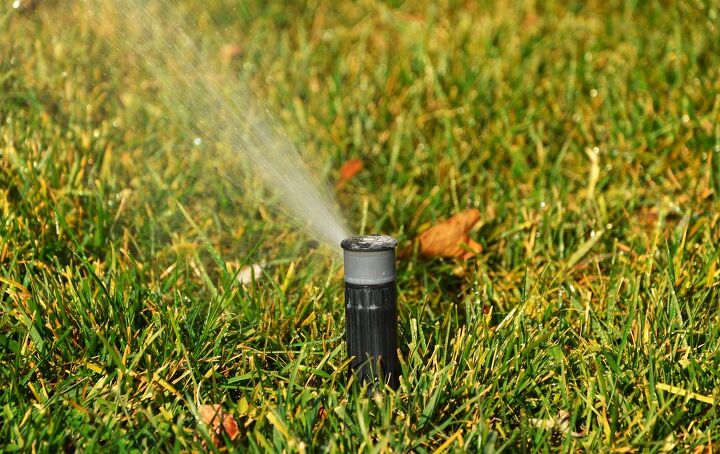






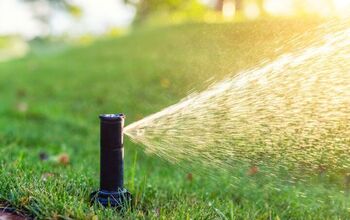

![The 5 Best Angle Grinders – [2022 Reviews & Buyer's Guide]](https://cdn-fastly.upgradedhome.com/media/2023/07/31/9071326/the-5-best-angle-grinders-2022-reviews-buyer-s-guide.jpg?size=350x220)

